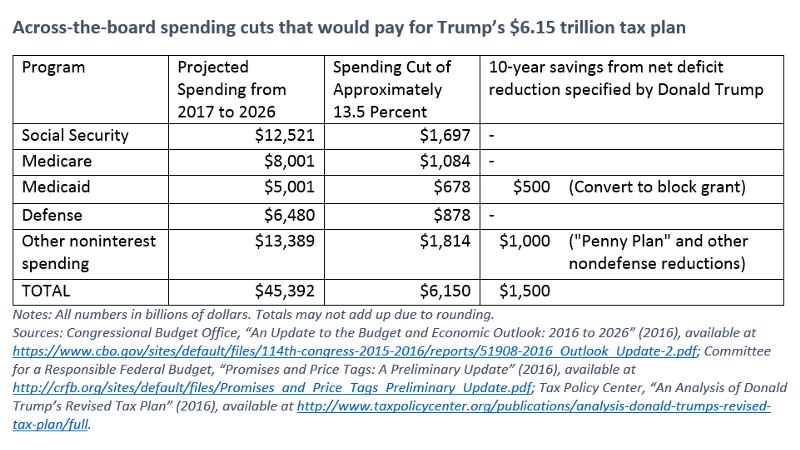By: Harry Stein
 Credit: Gage Skidmore
Credit: Gage Skidmore
Donald Trump has attracted a lot of attention for denouncing plans to cut Social Security and Medicare. In 2011, Trump said it was “political suicide for the Republican Party” to pass a budget plan authored by Rep. Paul Ryan (R-WI) that called for Medicare cuts.
At the same time, however, contradictory statements from Trump and his campaign cast doubt on his commitment to Social Security and Medicare. And Trump’s tax cuts for the wealthy will make his claim to support Social Security and Medicare just another broken promise to working families.
Trump’s tax plan would cost approximately $6 trillion over 10 years, and approximately half of the benefit would go to the top 1 percent. While Trump has promised to deliver unrealistically huge economic growth, Moody’s Analytics reports that his agenda would instead cause a “lengthy recession.” Trump’s economic recklessness also worries leading economists who served Democratic and Republican presidents, and the Wall Street Journal could not identify any former members of the White House Council of Economic Advisors who supported Donald Trump.
Trump says his agenda “will be completely paid-for,” but paying for his tax plan would require cutting federal spending by an average of approximately 13.5 percent. In the next 10 years, an across-the-board cut of 13.5 percent would mean cutting Social Security by $1.7 trillion and cutting Medicare by $1.1 trillion. For other parts of the federal budget, the spending cuts that Trump has advocated would not be sufficient to achieve a 13.5 percent cut, much less exceed this threshold in order to limit cuts in other areas.
Trump’s actual Social Security and Medicare cuts would likely be even larger, since these calculations assume that Trump also cuts defense spending by nearly $900 billion. This defense cut would have to be relocated to other programs if Trump follows through on his plans to increase defense spending. The only spending that would not be cut in this scenario is interest on the national debt, although Trump has even recklessly suggested that he might spark an economic crisis by defaulting on the debt.

In August 2016, the average monthly Social Security benefit was $1,238, and a 13.5 percent cut would reduce this benefit by $168 a month. This is equivalent to an annual benefit cut of approximately $2,000. More than 60 million Americans receive Social Security benefits. In addition to retirees, Social Security also supports surviving spouses and dependents of deceased workers, as well as disabled workers and their families.
America cannot afford to gamble with Social Security. Over 40 percent of elderly Americans would live in poverty without Social Security, and people of color are especially likely to rely on Social Security to provide at least 90 percent of their retirement income.
Trump is more prepared to cut Social Security and Medicare than it might appear from some of his recent comments. While Trump might think it is political suicide to tell voters he plans to cut these programs, Trump economic advisor Sam Clovis says a Trump Administration would start considering changes to Social Security and Medicare after settling into office. In 2000, Trump called Social Security a Ponzi scheme, and advocated reducing benefits and privatizing the program. A Republican Congress led by Speaker Ryan would be eager to finally enact their plans to cut and privatize these programs.
Worst of all, Social Security cuts are completely unnecessary, and the Obama Administration has already made substantial progress to increase efficiency and reduce costs in Medicare. By raising additional revenues instead of giving tax cuts to the wealthy, lawmakers can expand Social Security benefits and protect a program that has worked since 1935.
In Atlantic City, working families have already seen their retirement savings ruined by Donald Trump’s broken promises. Just like the wild promises that Trump has made on the campaign trail, Trump promised that his Atlantic City casinos would deliver huge profits, and encouraged his workers to buy the casino stock with their retirement savings. When Trump’s casinos went bankrupt from Trump’s massive debt, these workers were forced to sell their casino stock for next to nothing. Trump called the bankruptcy a “success,” and made millions of dollars as the chairman of Trump Hotels and Casino Resorts.
When Trump’s tax cuts deliver huge windfalls for the wealthy but a recession for everyone else, once again it will be working families left holding the bag.